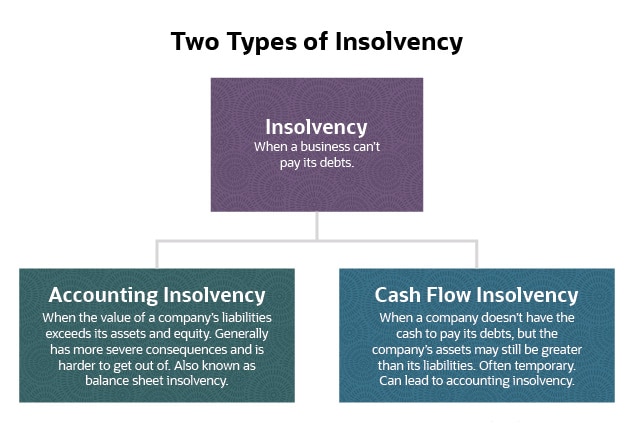Things about Insolvency Practitioner
Table of ContentsThe Basic Principles Of Insolvency Practitioner Insolvency Practitioner Things To Know Before You Get This7 Simple Techniques For Insolvency PractitionerInsolvency Practitioner for BeginnersExamine This Report about Insolvency PractitionerHow Insolvency Practitioner can Save You Time, Stress, and Money.How Insolvency Practitioner can Save You Time, Stress, and Money.
Insolvency is when obligations are above the value of the business, or when a borrower can not pay the financial obligations they owe. A firm can become insolvent as a result of a variety of circumstances that result in poor cash money circulation. When confronted with insolvency, a service or individual can get in touch with financial institutions directly and restructure financial debts to pay them off.Insolvency can cause bankruptcy proceedings, in which lawsuit will certainly be taken against the bankrupt individual or entity, and properties may be sold off to settle superior financial obligations. Entrepreneur may speak to creditors straight and restructure financial debts into even more manageable installments. Financial institutions are generally open to this strategy due to the fact that they intend to be paid off and prevent losses, even if the settlement is on a delayed schedule.
Insolvency Practitioner Fundamentals Explained
The owner produces a proposal describing how the financial obligation might be restructured utilizing price decreases or various other plans for support. The proposition reveals financial institutions exactly how the organization may generate enough capital for lucrative procedures while paying its debts. Normally, a forgiven financial obligation may be taken into consideration revenue by the Irs (INTERNAL REVENUE SERVICE).

An Unbiased View of Insolvency Practitioner
Business may wind up paying large amounts of cash in damages and be incapable to continue procedures. When operations discontinue, so does the company's revenue. Lack of earnings causes unpaid costs and creditors asking for cash owed to them. Some business become bankrupt since their goods or solutions do not advance to fit consumers' transforming needs.
Costs surpass incomes and costs stay unsettled. Cash-flow insolvency takes place when a business has the possessions to cover their debts yet they are in the incorrect form, such as real estate instead of liquid funds. Balance-sheet bankruptcy, on the various other hand, indicates a lack of properties in any type of form to cover debts.
The internal revenue service states that an individual is insolvent when the overall liabilities exceed complete properties. A insolvency, on the other hand, is an actual court order that portrays how a financially troubled individual or organization will repay their creditors, or just how they will certainly offer their assets in order to make the settlements.
4 Easy Facts About Insolvency Practitioner Shown

Financial obligation consolidation is when you combine numerous finances right into one new finance, often to accomplish better terms. Insolvency is not the exact same as insolvency, although a firm that has become financially troubled might declare insolvency. Bankruptcy is the state of not being able to pay your responsibilities while personal bankruptcy is a lawful procedure to discharge your financial debts.
Comprehending the aspects that can lead to bankruptcy, such as overspending, can help you stop insolvency and its consequences.
5 Easy Facts About Insolvency Practitioner Shown
It is well known that directors and policemans of firms (and supervisors of minimal responsibility business) owe fiduciary duties to their organizations and their investors (or members). These fiduciary commitments are specified by state laws and, though there are variations from state to state, they typically include a duty of commitment and an obligation of care.
The task of care calls for directors and officers to work out persistance, to make informed choices, and to act in great faith to make sure that their actions remain in the ideal rate of interest of the company. Though beyond the range of this conversation, some states allow these responsibilities to be restricted either by so noting in the organizational papers or abiding by other demands.
The Only Guide to Insolvency Practitioner
The majority of states specify insolvency in 2 ways( 1) when a company's responsibilities come to be more than the amount of its properties or (2) when the firm comes to be unable to pay its debts as they Web Site come to be dueand accept both interpretations (Insolvency Practitioner). The shift in duties occurs since when a business is financially troubled, there is no worth in the company beyond that owed to the business's creditors to ensure that the equity holders no much longer have a financial risk in the company
Take care concerning giving investors favoritism at the cost of lenders (e.g., licensing and funding a reward or a stock redemption). Beware about favoritism between courses of shareholders. Make reasonable efforts to find out all the truths before taking a details strategy; directors need to really think that any choices made remain in the most effective rate of interests of the firm in its entirety (i.e., choices will be reviewed in hindsight due to the effect of such activities on the corporation).
In any bankruptcy or insolvency proceeding, payments made to certain financial institutions at the expense of other financial institutions can be clawed back, specifically if there is some connection between the company and the creditor. Consider recommending at a yearly investor meeting (or any type of other meeting of investors) a resolution verifying that all previous company decisions and actions taken by the directors and officers of the corporation were absorbed good belief after a workout of sensible treatment.
How Insolvency Practitioner can Save You Time, Stress, and Money.
Fully divulge any type of personal or organization connections with celebrations beyond of transactions involving the corporation to avoid the look of a problem of interest. In examining possible fund elevating deals or a sale of assets of the struggling company, realize that these purchases might be scrutinized later taking into account any kind of subsequent her latest blog expansion of supervisors' fiduciary responsibilities to include lenders.
Comments on “Insolvency Practitioner Fundamentals Explained”